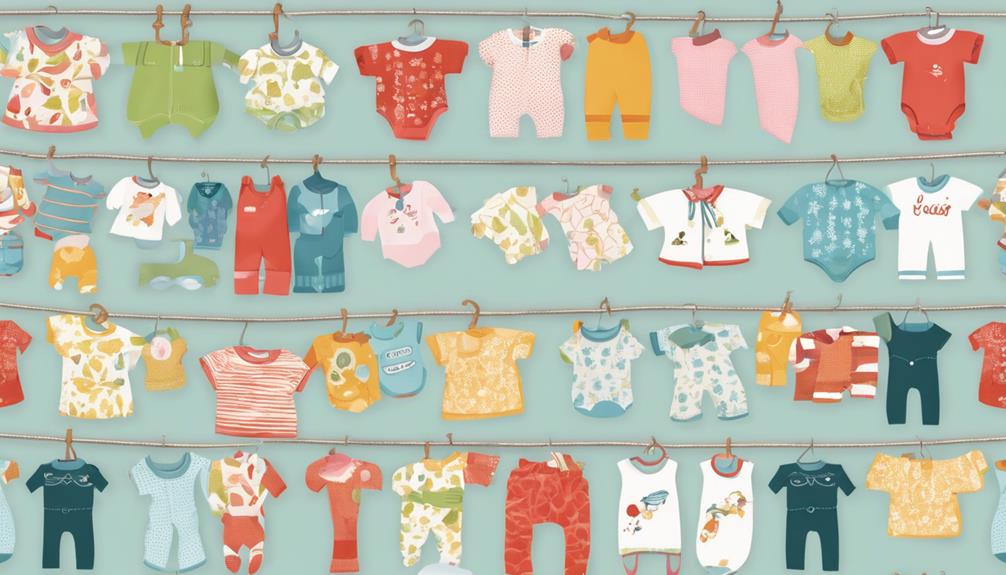If your newborn frequently experiences hiccups after feedings, you might be wondering what steps you can take to provide relief. While hiccups are usually harmless, understanding the causes and effective strategies to manage them can help ease your baby's discomfort.
By exploring various techniques and learning when to seek professional advice, you can navigate this common challenge with confidence.
Key Takeaways
- Understanding newborn hiccups as a normal part of development.
- Tips to alleviate hiccups include offering a pacifier and creating a calm feeding environment.
- Seek medical advice if hiccups persist over 10 minutes or affect feeding.
- Prioritize proper feeding techniques and frequent burping to prevent hiccups.
Understanding Newborn Hiccups
If your newborn is experiencing hiccups, understanding why this common occurrence happens can provide reassurance and insight into their development. Newborn hiccups are a normal part of your baby's growth, linked to the diaphragm's movements and the opening and closing of vocal cords. These tiny hiccups are often noticeable during feeding or when your baby is feeling stressed. While it may seem concerning, most newborns experience hiccups frequently, which is a positive sign of their health and brain development.
These hiccups usually resolve on their own within a few minutes and rarely cause discomfort to your little one. To help manage these hiccups, you can try simple strategies like burping your baby during feeding, slowing down the feeding process, or holding your baby upright for a short period after meals. By incorporating these techniques, you can ease any potential discomfort your baby may experience due to hiccups and support their overall well-being.
Causes of Newborn Hiccups

Newborn hiccups occur when your baby's diaphragm contracts involuntarily, often triggered by factors like fast feeding, excitement, or swallowing air. Your baby's immature nervous system can also play a role in these frequent hiccups. The diaphragm, a muscle beneath the lungs that helps with breathing, can sometimes spasm, causing the hiccup sound you hear.
It's important to remember that newborn hiccups are usually harmless and rarely bother babies. In most cases, these hiccups resolve on their own within a few minutes. Your baby's hiccups are a normal part of their development and not typically a cause for concern. Understanding the causes of your baby's hiccups can help you feel more at ease when they occur.
If you notice that your baby has hiccups often, try to identify any potential triggers like feeding speed or excitement, and remember that it's a natural process as their body adjusts to the outside world.
Tips to Alleviate Newborn Hiccups

To help alleviate newborn hiccups, consider implementing simple techniques such as burping your baby during and after feeds to release trapped air. Here are some additional tips to help soothe your little one:
- Offer a pacifier: Giving your baby a pacifier to suck on can help relax the diaphragm, potentially stopping the hiccups.
- Allow hiccups to resolve: It's usually best to let newborn hiccups resolve naturally within 5 to 10 minutes.
- Create a calm feeding environment: Establishing a peaceful atmosphere during feeding time can help prevent hiccups from occurring.
- Seek medical advice if needed: If your baby's hiccups persist or if you're concerned, don't hesitate to seek advice from a healthcare provider.
Preventing Newborn Hiccups

To prevent newborn hiccups, prioritize burping your baby frequently during feedings to release trapped air that can lead to these episodes. Ensuring your baby is burped multiple times throughout the feeding process can help minimize the chances of hiccups occurring.
Maintain a calm feeding environment to prevent your baby from getting overly excited, as this excitement can trigger hiccups. Proper feeding techniques, such as ensuring a good latch during breastfeeding or using the correct bottle-feeding method, can help minimize the intake of excess air that may cause hiccups.
Additionally, holding your baby upright for 20-30 minutes after feeding can aid in digestion and reduce the likelihood of hiccups. Be mindful not to overfeed your baby, as this can lead to a too-full stomach and contribute to hiccups.
When to Seek Medical Advice

If your baby's hiccups persist for more than 10 minutes, seeking medical advice is recommended. It's crucial to be attentive to your newborn's well-being and know when to reach out for help.
Here are some signs that indicate it's time to consult a healthcare provider:
- Immediate medical attention is necessary if hiccups are accompanied by changes in skin color.
- Consult a healthcare provider if hiccups interfere with the newborn's feeding or sleeping patterns.
- Be cautious with home remedies and consult a doctor if unsure about their safety for newborns.
- Contact a healthcare professional if newborn hiccups seem to cause distress or discomfort.
Your baby's comfort and health are a top priority, and any concerns about their breathing difficulties or unusual reactions should prompt you to seek medical attention promptly. Trust your instincts as a parent and don't hesitate to reach out for support when needed.
Frequently Asked Questions
How Do I Relieve My Newborns Hiccups?
To help relieve your newborn's hiccups, try burping them during and after feeding to release trapped air. Changing their feeding position or offering a pacifier can relax the diaphragm. Allow hiccups to pass naturally within 5-10 minutes.
Is It OK to Lay My Newborn Down With Hiccups?
It's perfectly fine to lay your newborn down with hiccups. They're usually harmless and will pass on their own. Focus on creating a calm environment for your little one, who can sleep comfortably even with hiccups.
What Positions Help Newborn With Hiccups?
When your newborn has hiccups, try holding them upright against your chest or laying them slightly inclined on their back. Supporting their head while on their stomach or laying them on their left side can also bring relief. Gentle rocking may help.
Do Hiccups Mean Baby Is Full?
When your baby hiccups, it's more about their developing system than fullness. Just like a car's engine idling, hiccups are natural and don't solely signal a full tank. Trust your instincts and observe your little one's cues.
Conclusion
So, there you have it, dealing with newborn hiccups is just a hiccup in the grand scheme of parenting. Remember to stay calm, try some gentle techniques, and most importantly, don't stress too much about it.
After all, babies hiccup, and so do we sometimes. Just enjoy these little moments with your little one – hiccups and all!










